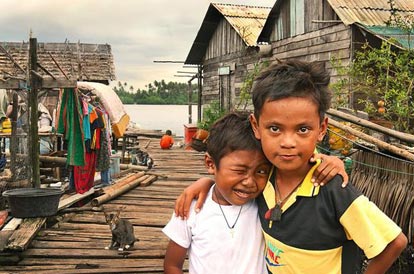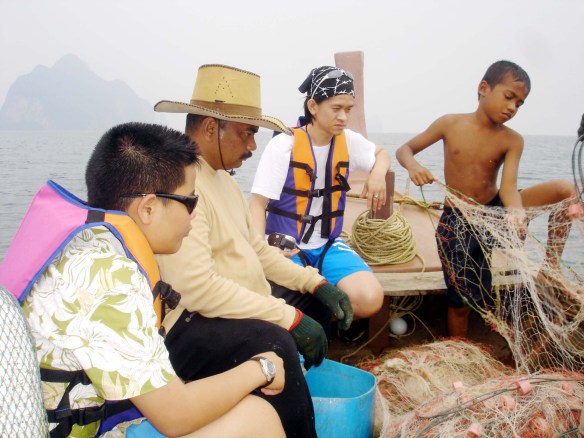Staying with the locals in Thailand

The thought of spending your hard-earned holiday in the home of an accountant is, perhaps, not the most inspiring. Locate that home on a tropical island, mix with beaches, sunsets, platefuls of seafood and some of the friendliest people, however, and it begins to sound more appealing. Then factor in that the accountant is a trained volunteer, working on the books of an award-winning community based tourist initiative, and it suddenly becomes an intriguing prospect.
To reach this accountant's home is easy enough. The small public ferry from Bangrong pier, an hour east from the popular tourist destination of Phuket, delivers you in an hour to Koh Yao Noi – an island in the middle of sparkling Phang Nga Bay which, jutted with limestone karsts, is one of the most beautiful stretches of ocean in Thailand.
"Our guests can't choose which house they will stay in," said Bang Bao, the co-ordinator of the Koh Yao Noi Homestay Club as I got off the boat. "We have 25 families that are part of the programme and we operate a strict rotation policy," he said. "That way the money we receive gets as widely distributed as possible."
Koh Yao Noi's Homestay Club began life 13 years ago. It was set up by Community Based Tourism Initiative (CBT-I), a Thai NGO that trains communities to create tourism facilities that are directly controlled by the local population. The one on Koh Yao Noi – a largely Muslim island whose economy depends on local crab and prawn fisheries – has helped fund a successful campaign for conservation in the local seas, forcing big factory ships to go elsewhere.
"Part of your package fee is a direct donation for this campaign," said Bang Bao. Just as importantly, in a community where the average wage is around US $6 a day, income derived from homestay guests goes straight into the hands of the local population. "About 80% of your money is given directly to the host family. It can really make a lot of difference over a year," he added as we set off on a tour of the island.
We passed fishing villages extending into the sea on elaborate networks of stilts. There were rice fields, buffaloes and small copses of tangled jungle. Compared to nearby Phuket, tourism on the island is almost absent – there's a couple of high-end resorts hidden behind concrete walls and a few bars, but that's it. The east side of Yao Noi is also home to a smattering of beaches. "Most visitors prefer the beaches on the islands nearby," said Bang Bao. "You'll be visiting one tomorrow."
I soon discovered that my "home" was in the small village of Lam Sai and belonged to the local carpenter, Bang Sar ('Bang' means brother in the local Islamic dialect) and his wife Jah Bat ('Jah' means sister), the homestay programme's accountant. The airy wooden house, surrounded by neatly tended lawns and tropical flowers, was built by Bang Sar himself.
"This your room," he said, as he led me through his home. The room itself was basic but spotless and comfy enough – a soft mattress, small electric fan and mosquito net. Other facilities in the house included a bucket-style shower to sluice yourself with cool water – incredibly refreshing in the heat – and a squat-toilet.
If the bedroom could accurately be described as one-star, the dinner that followed was definitely five-star: a mountain of succulent, fresh crab and prawn served with dishes of spicy lime dipping-sauce and bowls of thick beef curries. "I show you how to eat crab," said Bang Sar, expertly breaking open the shells, nimbly rescuing all the meat and decanting it on to my plate.
Morning brought the crow of cockerels and the call to prayers at the mosque. Jah Bat brought hot tea and small banana leaf-wrapped goodies – slabs of sticky rice topped off with sweet jackfruit and flaked coconut. I shared my breakfast with Karem, Jah Bat's younger brother, who spoke excellent English. "This morning we'll be heading over to an uninhabited island," he said.
A long, thin fishing-boat was our mode of transport. "The fisherman needs to get his crab-nets first," said Karem above the din of the engine. We made two stops – when dozens of abalone and crabs were pulled in by hand - but it wasn't long before we arrived at a tiny, tropical island, complete with flawless beach and small shaded grove. The next few hours were spent in splendid isolation, lazing on the sands and swimming in the warming sea. Jah Bat's massive picnic required some effort but our energies were spent doing very little – a perfect moment.
That evening we sat with cousins, nieces and nephews on the family balcony devouring another feast. Despite the humble surroundings, there was a genuine and infectious warmth that the luxury end of the travel market could only dream of. This was the friendly, gracious Thailand that first bewitched travellers such as myself 20-odd years ago but which is now almost completely lost to the advance of glamorous resorts and package tours. I certainly found a gem on Koh Yao Noi and a community seemingly strong enough to fend off the worst excesses of tourism while taking some of the best bits – our money - directly into their pockets.
Jah Bat headed to her desk. She sat down and began to work, by hand, on the Koh Yao Noi Homestay Club's accounts. It dawned on me that the idea of holidaying with an accountant will never conjure up the same image again.
By Andrew Spooner
11 November 2008
www.theguardian.com


